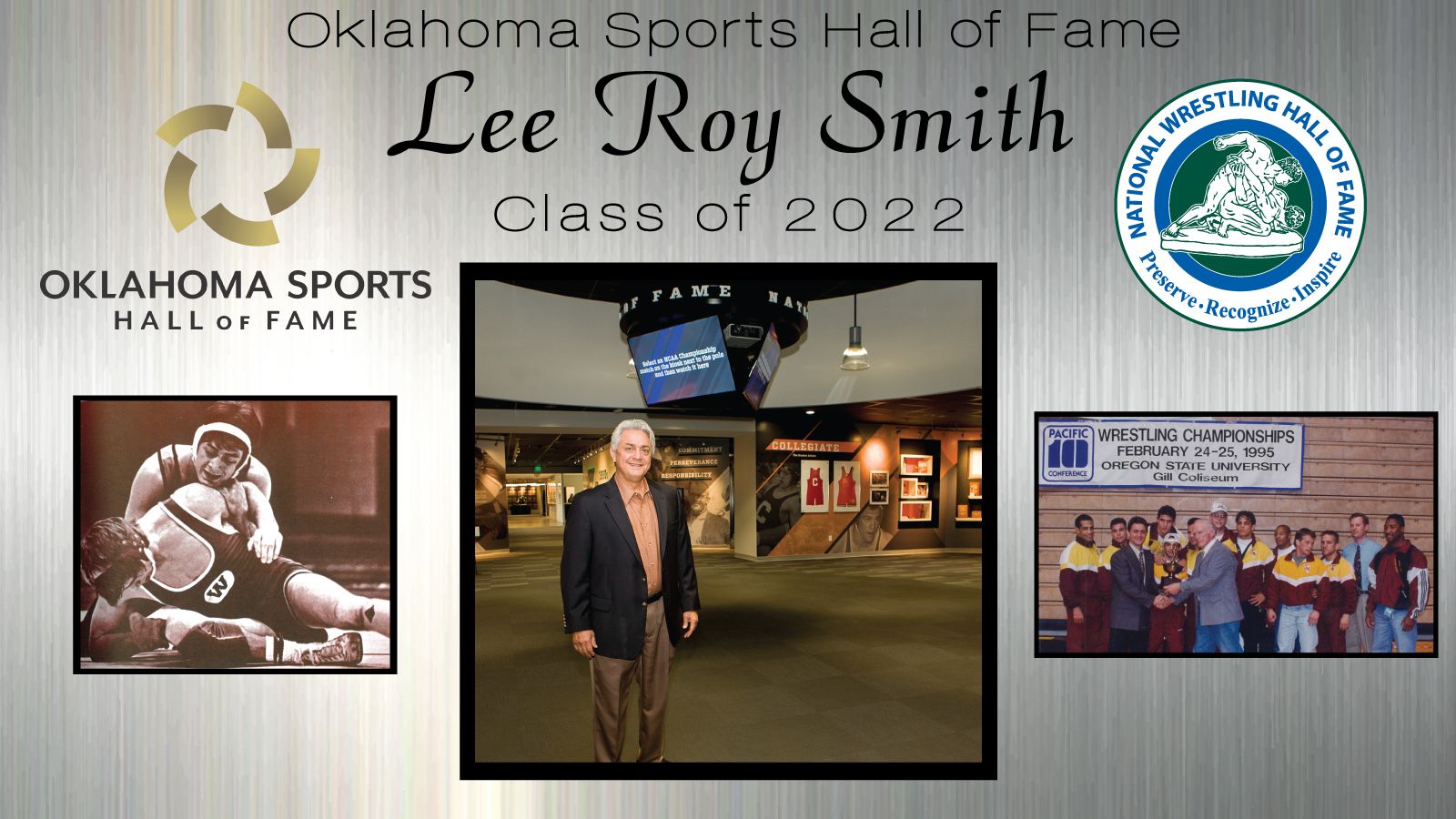
Hall of Fame Executive Director Smith Selected For Induction Into Oklahoma Sports Hall of Fame
The National Wrestling Hall of Fame is excited to announce that Executive Director Lee Roy Smith has been selected for induction into the Oklahoma Sports Hall of Fame.
“It is a tremendous honor to be recognized, but it is even more meaningful because it is my home state, a state that has an amazing and rich athletic history, particularly in our great sport of wrestling,” said Smith, who became executive director of the National Wrestling Hall of Fame and Museum in 2004. “I have had the pleasure of watching many of the honorees and the opportunity to join my brothers, John and Pat, makes it special.”
The other members of the Class of 2022 are Chuck Bowman, Lane Frost, R.W. McQuarters, Wilcy Moore and Tinker Owens. The Class of 2022 will be formally recognized at the at the Oklahoma Sports Hall of Fame's Induction Ceremony on August 15, 2022 at the National Cowboy & Western Heritage Museum in Oklahoma City.
From the brink of bankruptcy, Smith has steered the National Wrestling Hall of Fame to financial solvency, including the acquisition of the Dan Gable Museum in Waterloo, Iowa. In the last decade, he has spearheaded capital campaigns for state-of-the-art renovations for both museums, $3.8 million in Stillwater and $1.5 million in Waterloo.
The Del City, Oklahoma, native began wrestling in the fourth grade, beginning what would grow into a family sports dynasty in the state and across the globe. The second oldest of Madalene and Lee Roy Smith’s 10 children, he was the first two-time Oklahoma state champion for Del City High School, compiling an overall record of 71-3 and being named Outstanding Wrestler at the state tournament as a senior. He was also the first wrestler from Oklahoma to win two National Junior Freestyle Championships.
A four-time Big Eight Conference champion and three-time All-American for Oklahoma State, he capped his career with an NCAA championship at 142 pounds in 1980. Smith was the first wrestler in OSU’s storied history to reach 100 wins and was the Cowboys’ 1980 Athlete of the Year.
After college, Smith began his coaching career as a graduate assistant for OSU while continuing to compete internationally. He won the National Open Freestyle Championships three times and twice was named Outstanding Wrestler. He won the 1984 Olympic Trials and qualified for two World championship teams, earning a silver medal in 1983, while also capturing silver medals at the World Cup in 1983 and 1984.
Smith helped recruit his younger brother John to OSU, coaching him to two All-America finishes and his first NCAA title in 1987. He then moved to Switzerland to work as a member of the Swiss Wrestling Federation national coaching staff and be head coach of the Martigny Wrestling Club. Smith conducted training camps in preparation for international competition that resulted in the Swiss team having its best finish ever at the Freestyle World Championships in 1987. He also led Martigny to a second-place national finish in 1988, its first top-three finish in over 10 years.
Smith returned to the United States two years later to become USA Wrestling’s national freestyle coach. In four years leading the U.S. team, he coached six World champions, three Olympic gold medalists, 10 World silver medalists, two Olympic silver medalists, a World bronze medalist and an Olympic bronze medalist. In 1992, with younger brother John and fellow Oklahoman Kenny Monday on the team, Smith led the United States to its best Olympic finish with three gold medals, two silver medals and a bronze medal with all 10 wrestlers finishing in the top seven while scoring a record number of team points. His teams finished first twice and second twice at the World Cup and he also coached the U.S. to its first dual meet victory on Soviet soil in Mogilev, Belarus on January 20, 1990.
After the 1992 Olympic Games, Smith became the head wrestling coach at Arizona State University. In nine years at the ASU helm, he compiled an overall record of 91-58-1 while coaching three NCAA champions, 28 All-Americans and 27 Pac-10 Conference champions. He led the Sun Devils to five Top 10 finishes at the NCAA Division I Championships and five Pac-10 Conference titles. He was named Pac-10 Conference Coach of the Year four times and was the national Rookie Coach of the Year in 1993. In addition to success on the mat, Smith’s teams achieved the highest graduation rate of any sport at ASU.
He was selected to work as a member of the broadcast team for the 1996 Olympics, using his expertise to describe action so that the camera operators could provide the best possible shots of the wrestling. He returned to the Olympics in 2000, serving as wrestling’s expert liaison between competition management and the international television production staff.
Smith’s two youngest brothers, Pat and Mark, followed their older brothers into wrestling and to OSU. Pat was the first four-time NCAA Division I champion while Mark was a three-time All-American. Lee Roy, John and Pat are the first and only three brothers to each win an NCAA title. Heading into 2022, the Smith siblings and their direct descendants have combined to win four World gold medals, two Olympic gold medals, a World silver medal, 11 NCAA titles, 22 All-America honors, 21 college conference titles, 23 state high school championships, two national prep titles, and nine national junior freestyle championships.
Smith joins fellow wrestlers honored by the Oklahoma Sports Hall of Fame: Wayne Baughman, Doug Blubaugh, Tommy Chesbro, Kendall Cross, Bob Dellinger, Tommy Evans, Ed Gallagher, Eddie Griffin, Art Griffith, Danny Hodge, David James, Kenny Monday, Yojiro Uetake Obata, Port Robertson, Myron Roderick, John Smith, Pat Smith, Jack VanBebber, and Wayne Wells. Baughman, Blubaugh, Chesbro, Cross, Dellinger, Evans, Gallagher, Griffith, Hodge, Monday, Obata, Robertson, Roderick, John Smith, Pat Smith, VanBebber, and Wells are all Distinguished Members of the National Wrestling Hall of Fame.